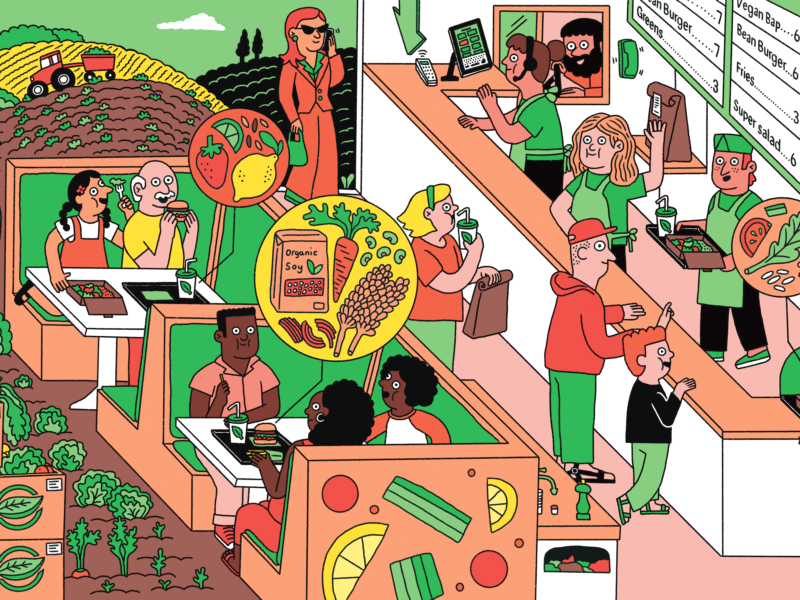The search for a room of one’s own—on Instagram.
Pakistanis were late adopters of social media culture, but that is now changing rapidly; emerging Instagram influencers with tens of thousands of followers have become the subject of articles in online magazines and on television. One of the most notable aspects of Pakistani influencer culture is the rise of women, who are finding a space and a voice in the country’s deeply conservative, patriarchal culture.
Tanzeela Khan is a publicist as well as a style and beauty influencer, with over 100,000 Instagram followers. In her carefully curated photos she models outfits that highlight the latest fashions from both East and West, with captions that offer observations about her social life and her emotions. A photo posted on January 20 shows Tanzeela in a plum colored chenille coat with a matching face mask, captioned #motd (message of the day).
Pakistani society frowns upon women who work outside the home; social media platforms offer them an opportunity to both stay at home and become entrepreneurs. The pandemic lockdown didn’t spark the rise of Pakistani influencer culture, but it definitely caused it to grow exponentially.
Women comprise 49 percent of Pakistan’s population, but only 24 percent of the labour force. The unpaid labor of domestic duties is not classified as work, which is a consequence of the fact that women are deprived of a space in the discourse for their own narratives. A few newspaper headlines illustrate widely held views on women in the workforce.
- “No country for working women,” (Pakistan Express, March 10, 2018)
- “Should Pakistani women get a job? Yes but.. Say Pakistani men,” (World Bank Blogs, April 5, 2019);
- “Problems working women face” (Dawn, May 9, 2019)
While these articles make it clear that Pakistani women face severe challenges in seeking work outside the home, they focus on data while ignoring the human stories that show how women are affected by the lack of opportunities to embark on a career. Nor do they offer solutions, or suggestions for a path forward. The voices of women are not heard, whether they stay at home or go out to work. Tooba Syed, a feminist activist, pointed out in an Opinion piece for Dawn newspaper that women who do enter the workforce generally work in “occupations that mimic care work; undervalued, underpaid and further reinforcing women’s primary gender role as a caregiver.”
Influencer culture provides Pakistani women with a space completely their own, neither dominated by men nor governed by existing norms of what is and isn’t acceptable—at least not directly.
Saman Zahrai, who moved from her native Lahore to London after she married, started out as a mommy blogger in 2018. “There was so much about mommyhood that I just wanted to share,” she said. She had been online for months before she recognized the opportunity to monetize her Instagram posts. As her blog developed, she began to incorporate other interests and to learn what interested her followers. This helped her make the shift to becoming a fashion influencer who shares her style choices, which include both traditional Pakistani outfits and European trends. Zahrai still visits Lahore frequently; she said the contrast with her life in London has made her acutely aware of the extent to which her native country denies women a space of their own. Blogging and influencing, she confirmed, can feel very liberating for women who want to express themselves in an environment that is free of social opprobrium and not controlled by the male gaze.
Some influencers mix it up, with glamorous posed style photos alongside social justice messages. Rimsha Waseem, an influencer from Karachi who has more than 52,000 followers, says that she feels a responsibility to include social responsibility messaging with her fashion and makeup content. In addition to launching a campaign for breast cancer awareness on her YouTube channel, she worked with a local manufacturer of feminine hygiene products to raise awareness of period poverty.
Rimsha, Saman and Tanzeela come from privileged backgrounds. Their families are well off, they are educated, speak English, and have unlimited access to the internet and social media. In taking advantage of the opportunity to amplify their own voices and carve out their own space, they are paving the way for other women. Pakistani feminists understand that the few need to champion the many. But critics of the new influencer culture claim the young women who model their glamorous clothes and lifestyle on Instagram and YouTube are wasting their time; that they are immodest; or that they are unrepresentative and out of touch.
The fatal flaw in the claim that Pakistan’s female influencers are out of touch with their country’s social reality is the case of Qandeel Baloch, the first and most famous influencer of them all. Unlike Tanzeela, Saman, and Rishma, Qandeel was not from the educated upper class. She was born to a conservative family in a small rural town in the Punjab, grew up poor and was married off at age 18 to a cousin who, she said, was physically abusive. Baloch escaped the marriage and ran off to the big city, where she changed her name (her birth name was Fauzia Azeem), tried and failed to break into show business and then discovered that the surest path to fame was via social media. The videos Baloch posted on her Facebook wall, which had more than 500,000 followers, managed to be simultaneously sexually provocative, guileless, and socially critical. She monetized her fame with paid advertising, which allowed her to support her family. But in 2016 an ill-conceived stunt that exposed a prominent imam’s hypocrisy brought notoriety, threats, and unwelcome attention directed at her family. On a visit home shortly after the incident with the imam, her youngest brother smothered her to death while she slept—in a so-called “honor killing.” She was 26 years old.
The murder of Qandeel Baloch sent shockwaves across the country, and was widely covered by the media both in Pakistan and abroad. Baloch had spoken often about taking charge of her sexuality rather than letting the exploitative media industry do it for her. Now, her murder resonated even with women who had disliked Baloch’s provocative persona. She became an icon for resilience and for the principle that a woman had the right to her own voice.
Pakistani influencers from more privileged backgrounds still face significant challenges. Arranged marriages are a cultural norm for most families, but those who might have been interested in asking Rimsha to be their daughter in law see her career as a barrier. “People see it as me “showing myself off,”” said Rimsha. She added: “According to them it is not right for a girl to do, but no one sees the effort that goes into content creation.”
While most of the Pakistani influencers on Instagram are women, the trend of social media bloggers and personalities began on YouTube with Zaid Ali, a Canadian-Pakistani star vlogger. Ali led the way for male vloggers, most of whom create funny, relatable videos that are entertaining but not exactly substantive. What’s notable is that the men are applauded for their light and amusing videos, while female influencers are criticized for the same type of content. Male influencers are not accused of showing off or wasting their time.
Tanzeela says there’s still a long way to go before influencer culture becomes mainstream in Pakistan. So far it has provided a space and a voice for women with talents and business acumen that they had kept under wraps for too long. Rimsha said that the money she earns as an influencer has allowed her to move toward financial independence. “I’ve managed to fund my travels, and support myself in other means which I am very grateful for,” she said.
Very few women ever live alone in Pakistan; the norm is to go from their family home to their husband’s family home. Nor is financial independence for women a widely understood concept, let alone a valued one. But influencer culture and blogging have opened new doors for women to earn money on their own terms. The financial independence is gratifying, and is a small step toward broader social acceptance of women who earn their own living.
These are strong, smart women who have figured out how to monetize their passions. Pakistan needed a space where women could own their brands; we must move past the point of looking down on fashion, style or beauty as lesser content, which boils down to pulling people down. Rimsha is a strong advocate for lifting up and supporting women. Global women’s movements have shown the power of solidarity over the years and the influencer culture is no different. There’s a new kind of working woman in Pakistan and she’s here to stay.



